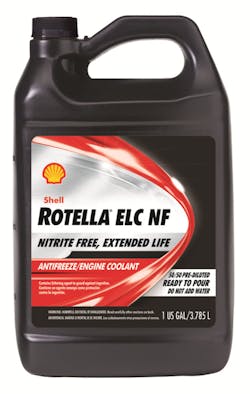NASHVILLE. A new website to help customers make sense of the next generation of diesel engine oils and the introduction of an engine coolant variation were the main topics of a Fleet Owner booth visit with Shell Lubricants at the Technology and Maintenance Council annual meeting this week.
The website is called WhatisPC11.com, and its purpose is to give people a heads-up about API Proposed Category 11 (PC-11). Shell Rotella created the website to be a resource for topics such as the fundamentals of PC-11, impending changes, testing updates, and how it is expected to affect new, current and older engines when the category replaces API CJ-4 engine oils by 2017.
“PC-11 is a constantly developing specification and new information is available regularly to guide the industry through the expected changes,” said Kate Faucher, global marketing projects lead for Shell Lubricants. “The new Shell Rotella interactive PC-11 website will serve as a resource for fleets, owner/operators and anyone driving a diesel powered pickup truck or operating equipment to learn more about PC-11 and how it will affect their business.”
WhatisPC11.com explains the creation of PC-11, why a new oil standard is necessary to replace CJ-4, and how new lower viscosity oils are being developed.
Unlike past categories that are backward compatible with the previous category, the new category will have two subcategories: one that is backward compatible to older engines and one that will work with upcoming engine designs.
Therefore, education about both oils will be vitally important to ensure seamless integration for every industry affected by this change, according to Shell.
“With two subcategories and new engine hardware tests, there will be lots of questions about how the oils will be formulated and which oil should be used for different applications,” said Dan Arcy, OEM technical manager for Shell Lubricants. “As we formulate and test the new oils, Shell Lubricants can offer valuable resources to those operating diesel engines both on- and off-highway to support them through the transition over the next few years.”
The new API PC-11 category is being driven by changes in engine technology to meet emissions, renewable fuel and fuel economy standards for reduced CO2 and other greenhouse gas emissions.
In addition, changes in engine hardware and operating conditions that better represent new engine technology in the marketplace since the last heavy-duty engine oil category was introduced in 2006, the company noted.
Nitrite-free formulation
Additionally, Shell Lubricants is expanding its portfolio with the introduction of Shell Rotella Extended Life Coolant - Nitrite Free (ELC NF). The new coolant joins the portfolio as the companion to Shell Rotella Ultra ELC. Both products are designed to meet the requirements of a growing segment of commercial vehicles that are moving to nitrite free engine antifreeze/coolant formulations to better protect aluminum components.
“Shell Rotella ELC-NF was formulated to meet more severe operational conditions of modern, hot-running engines,” said Stede Granger, OEM technical manager, Shell Lubricants. “This is particularly important for new emission engines, especially those with exhaust gas recirculation.”Shell Rotella ELC-NF provides improved protection of aluminum components including modern brazed aluminum heat exchangers and meets many of the newest OEM specifications. The versatile formulation may also be used in fleets that include passenger cars and light duty trucks.
The coolant is proven for extended life operation in medium and heavy duty diesel, gasoline, LNG and natural gas vehicles and engines.
Unlike other coolants, extended life coolants are designed to go 600,000 on-highway miles or 12,000 hours in commercial applications (and beyond with proper monitoring) and provide overall reduction in cooling system maintenance.
Extended Life Coolants also offer complete cooling system component protection by helping to reduce water-pump failures, hard-water-scale deposits and silicate gel, Granger explained.




